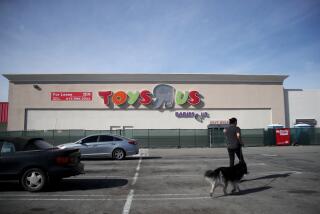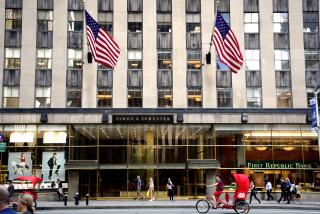1st Interstate Says Kohlberg Kravis Owns 10% Stake : Banking: The buyout specialist’s investment isn’t considered a prelude to any takeover attempt.
- Share via
Beleaguered First Interstate Bancorp disclosed Wednesday that the giant investment firm of Kohlberg Kravis Roberts & Co. owns nearly 10% of its stock, including 3.5-million shares bought this week as part of a critical stock sale for the Los Angeles-based banking firm.
Although KKR has previously expressed interest in making bank investments, the First Interstate stock purchase is atypical for KKR, best known for leading buyouts of such companies of Safeway Stores and the record-breaking $25-billion deal in 1988 for RJR Nabisco.
KKR’s stock purchase, made through an affiliate, is not considered a prelude to an eventual takeover by the investment firm because of regulatory roadblocks. Banking executives and analysts said the presence of KKR as an investor instead helps buy time for First Interstate’s new top management team to make changes many believe are long overdue. But, they added, it also pressures the company to move quickly.
“This isn’t patient money sitting there,” said one banker familiar with First Interstate.
KKR, which has quietly accumulated 4.6% of First Interstate’s stock for more than a year, often invests in companies in need of a financial revamping. Banking executives and analysts speculated that the buyout firm and institutional shareholders will pressure First Interstate to slash its bloated costs and possibly even dismantle part of its far-flung interstate banking network. If it fails, First Interstate will face increasing pressure to sell itself.
First Interstate and KKR portrayed the purchase as a friendly investment and vote of confidence in the much-maligned bank. First Interstate confirmed that KKR approached the bank about buying the stock and was not solicited as a friendly investor.
First Interstate President Edward M. Carson, who succeeds Joseph J. Pinola as chairman and chief executive on June 1, called it a “significant and tangible demonstration of confidence in First Interstate as an investment.” KKR partner George R. Roberts said KKR believes that First Interstate’s earnings will improve significantly and that KKR will continue as “long-term investors in the company.”
KKR’s $33-a-share, $115-million purchase this week was part of an important stock offering for First Interstate that netted it $276 million, far less than original estimates of $400 million. The stock was selling at nearly $50 a share when plans for the sale were announced in December. Word on Wall Street the past few weeks has been that the sale was going badly, and that institutional investors, upset by the bank’s recent disclosures of unexpectedly large problems in Texas and Arizona, were shunning the sale.
“This deal might have fallen apart if KKR had not bought the huge chunk,” said George Salem, bank analyst at Prudential-Bache Securities.
A First Interstate spokesman, however, said the bank was pleased given the soft market for bank stocks. The 7.5-million-share offer was oversubscribed, meaning there were more buyers than shares offered. Because it was oversubscribed, the sale will ultimately involve 8.6 million shares, with KKR picking up an additional 112,275 shares above the 3.38 million it initially bought. The bank’s stock rose $2 a share to close at $34.875 in active New York Stock Exchange trading Wednesday.
The stock sale was needed to help replenish First Interstate’s capital, the funds it must maintain to protect against losses. Its capital has dwindled as it has been forced to set aside money to deal with severe real estate loan problems in Texas and Arizona.
Scrapping the sale, as some institutional shareholders were urging, would have been a vote of no confidence in management. Regulators also would probably have moved fast to crack down on the firm and forced it to bolster itself financially. The bank still must boost its capital to meet certain other requirements that take effect in two years and is hoping to do so through additional profits.
First Interstate’s sagging stock and continuing problems in Texas and Arizona have increased speculation that it may be a takeover target. Some speculated that the large block was sold to KKR to provide insulation against hostile takeover threats, because conditions agreed to by both parties specify that KKR cannot add to its stake for two years. KKR also cannot sell the shares to a hostile suitor for two years without first offering them to the bank.
But many banking executives and analysts said they believe that those takeover threats have abated in recent weeks and that a hostile bid is highly unlikely. Hostile takeovers are rare in banking anyway, and a suitor would face difficult regulatory problems as well. In addition, industry executives said, bidders would probably be wary of buying First Interstate for fear of stumbling across more problems in its Texas and Arizona units.
No one expects KKR to attempt to buy First Interstate itself. Federal banking laws consider any company owning 25% or more of a bank to be a bank holding company, which would require huge divestitures of KKR’s non-bank holdings.
Also, any move by KKR to increase its stake to more than 10% would require approval by the Federal Reserve Board, Comptroller of the Currency and Federal Deposit Insurance Corp.
BACKGROUND
The history of the 1980s Wall Street takeover craze could not be written without prominent mention of Kohlberg Kravis Roberts & Co. As the leading practitioner of the leveraged buyout, KKR has gained control over as many as 35 companies since 1979. In these leveraged buyouts, KKR--often with the support of top management at the target firm--typically borrowed heavily to buy out public shareholders. KKR then repaid debts through asset sales and operating profits. The capper of KKR’s efforts was its $25-billion leveraged buyout acquisition in 1988 of RJR Nabisco. However, signs of trouble have appeared lately for KKR. One of its companies, Hillsborough Holdings, filed for bankruptcy protection in recent weeks while two others have struggled to pay debts and avoid bankruptcy.
FIRST INTERSTATE STOCK PRICE
Daily closing stock price, $ per share. Wednesday close: $34.875, up $2.
More to Read
Inside the business of entertainment
The Wide Shot brings you news, analysis and insights on everything from streaming wars to production — and what it all means for the future.
You may occasionally receive promotional content from the Los Angeles Times.










